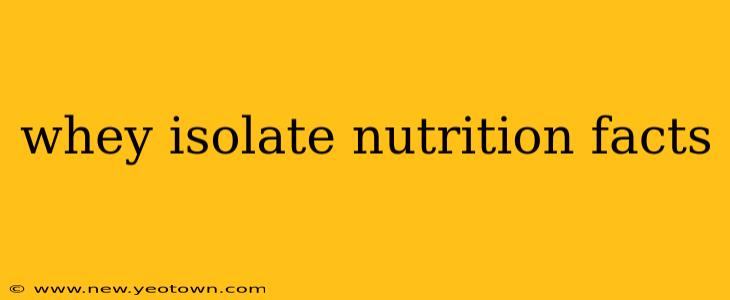Whey isolate. The name itself conjures images of ripped physiques and intense workouts. But what exactly is whey isolate, and what are the nutritional facts that make it so popular among athletes and health-conscious individuals alike? Let's dive into the world of this powerful protein powder and uncover its secrets.
Imagine this: you’re at the gym, pushing your limits. Your muscles are screaming, but you know you need that extra push to reach your goals. That's where whey isolate steps in – a concentrated form of protein, stripped of much of its fat and lactose, ready to fuel your recovery and muscle growth.
What Exactly is Whey Isolate?
Whey isolate is a highly purified form of whey protein. It's derived from whey, a byproduct of cheese production. Unlike whey concentrate, which retains some lactose and fat, whey isolate undergoes further processing to remove almost all of these components. This results in a protein powder that's incredibly pure, typically boasting over 90% protein content.
Whey Isolate Nutrition Facts: A Typical Profile
A typical serving (around 30 grams) of whey isolate will offer approximately:
- Protein: 25-30 grams – This is the star of the show, providing essential amino acids vital for muscle building and repair.
- Fat: Less than 1 gram – The minimal fat content makes it ideal for those watching their fat intake.
- Carbohydrates: Less than 2 grams – The low carbohydrate content is appealing for low-carb diets or those aiming to control blood sugar levels.
- Lactose: Minimal to none – This is a major advantage for individuals with lactose intolerance, who may experience digestive discomfort with other forms of whey protein.
It's crucial to remember: these numbers can vary slightly depending on the brand and specific product. Always check the nutrition label on your chosen whey isolate.
Is Whey Isolate Right For Me?
Who benefits most from whey isolate?
- Athletes and fitness enthusiasts: The high protein content supports muscle growth, repair, and recovery after intense training.
- Individuals with lactose intolerance: Its minimal lactose content makes it a suitable option for those sensitive to dairy.
- People seeking a clean protein source: The low fat and carbohydrate content makes it ideal for those following specific dietary plans.
Are there any potential downsides?
- Cost: Whey isolate tends to be more expensive than whey concentrate.
- Possible digestive issues: While generally well-tolerated, some individuals might still experience mild digestive upset, such as bloating or gas. Starting with a small amount and gradually increasing your intake can help minimize this.
- Allergic reactions: As with any protein powder, there's a potential for allergic reactions. If you have any dairy allergies, consult with your doctor or a registered dietitian before incorporating whey isolate into your diet.
What are the benefits of using whey protein isolate?
The primary benefit of whey isolate is its high protein concentration. This makes it an efficient way to increase your daily protein intake. The high protein content contributes to several health advantages, including:
- Increased muscle mass and strength: Protein is the building block of muscle tissue, and whey isolate provides the amino acids needed for muscle growth and repair.
- Improved satiety: Protein helps you feel fuller for longer, which can be beneficial for weight management.
- Enhanced immune function: Some studies suggest whey protein may support immune system function.
How much whey protein isolate should I consume daily?
The optimal daily intake of whey protein isolate depends on several factors, including your activity level, fitness goals, and overall dietary needs. General recommendations range from 0.8-1 gram of protein per kilogram of body weight per day. However, for athletes or those with specific fitness goals, higher intakes might be necessary. Consult with a registered dietitian or certified personal trainer for personalized recommendations.
What are some good sources of whey protein isolate?
Numerous reputable brands offer high-quality whey protein isolate powders. It's recommended to choose products from trusted manufacturers that clearly state their sourcing, manufacturing processes, and nutritional information.
Conclusion: Whey Isolate - A Powerful Addition to Your Health Journey
Whey isolate provides a powerful protein punch, with minimal fat and carbohydrates. Its high protein concentration and low lactose content make it a popular choice for athletes, fitness enthusiasts, and those seeking a clean protein source to support their health and fitness goals. Remember to consult with a healthcare professional before making significant changes to your diet.

